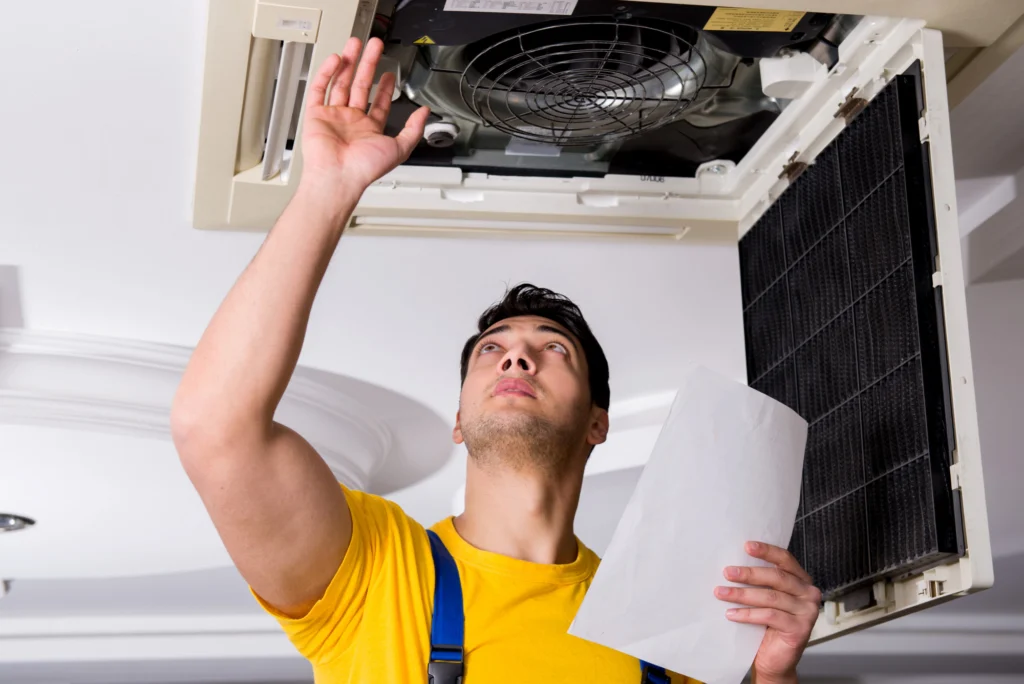HVAC systems have a lifespan too. Albeit, it’s a bit shorter than ours.
Nonetheless, the life of your HVAC can and should be prolonged. It’s through routine maintenance that we can achieve longevity for our systems.
In this article, we will cover the factors that affect the HVAC, typical life spans and replacing a system.
Keep reading to find out: how long do HVAC systems last?
Factors Affecting HVAC Longevity
When it comes to the longevity of your system there are many various factors that play a big part.
Global temperatures are getting warmer, but that’s not too much of an issue. The release of airborne particles, also known as off-gassing is a big problem for the lifespan of your HVAC unit.
The chemicals that are used in the building process of a home can cause the condenser coils inside of your AC unit to corrode quicker. Modern methods of construction homes mean that there is less natural airflow into the building. That may be a big plus for your energy bill but it also means chemicals from cleaning products and building materials will remain in the home longer.
For this reason alone, outdoor HVAC systems last longer than indoor units.
Another big factor that affects the lifespan of your HVAC is your usage of it. In most states, people use their AC a couple of months of the year. A machine that is used less often will last longer than that which is used all year long.
Here are some additional points of consideration for the life span of your HVAC unit:
- Poor maintenance
- Defective components
- Oversizing/undersizing of your system
- Improper installation
- Improper usage
- Salty/corrosive environments, such as living near the sea
Some of these issues may be beyond your control, but many are not. Lack of routine maintenance can lead to quicker component depreciation and a shortened life span for your unit. Oversizing (choosing a unit that is too large for your needs) means that your system will stop and start more frequently. This leads to more wear and tear and reduces lifespan significantly.
Let’s take a look at the typical longevity for HVAC units.
Typical Longevity for HVAC Units
Beyond the factors that affect longevity, the service life is dependent on the type of device. HVAC covers a large variety of devices, and is not limited to the ones listed below. Nonetheless, these are the most common and useful for residential properties.
- Furnaces: With routine maintenance, a gas furnace can last 30 years, and sometimes longer. Usually, a furnace is changed when a heat exchange starts to leak. Systems without maintenance might last 10 years, but that’s unlikely.
- Boilers: A boiler always lasts longer than a furnace. With an average life span of 35 years, it is only replaced when the heat exchanger starts to leak, much like a furnace. However, a boiler can freeze up in the winter when not used, therefore proper usage is important.
- AC: The majority of air conditioners last 15 years, but in reality, it’s closer to 10. In a coastal area, this number can be as low as seven years. They are replaced when a compressor or condenser fails.
- Ductless Mini-Splits: A ductless mini-splits provide both cooling and heating and can last anywhere from 10 to 30 years. If you live by the coast they will tend to corrode faster. This is due to the high alkalinity and salt-contents in the air that enters the ducts, and get processed by the copper condenser coils, which are susceptible to corrosion.
- Heat Pumps: A heat pump lasts about 20 years, but 15 is the average. Heat pumps are similar to air conditioners, but they can also provide heating and therefore they are used more often during the year. In a coastal area, a heating pump will last a maximum of 12 years.
Even though these are the common longevity time frames, a homeowner will probably replace a system sooner. As system ages, it becomes less efficient, increasing the utility and repair costs.
Once a system has reached a decade in age, the energy savings from a newer model can justify the investment by saving you money in running costs and repairs.
New System Upgrade
If your HVAC unit is older than 15 years or if your furnace is reaching 20, it’s probably the right time to change it. Especially if something breaks or you’ve had issues in the past.
When you factor in the repairs, labor, and replacement of components it can be as expensive as a new unit with installation coverage.
If you have a coal/oil furnace from 50 years ago, there’s very little chance that it will be working efficiently. Replacing this system will prevent all of the issues that you have somehow been able to avoid. It will also reduce your heating costs.
You might also want to replace a heat pump or evaporative cooler with a completely new HVAC unit, which will last as long if not longer than your previous system. It will function better and help you save money. The sooner you replace it, the sooner you can start to reap the benefits.
How Long Do HVAC Systems Last?
It’s a common question: How long do HVAC systems last? Now you know the answer, you are well on your way to replacing your old system or getting a new one for your new home. Either way, modern systems are made to last and are more efficient so can reduce your costs.
There’s really no reason not to get one installed. If you’re interested in a newer system, get in touch with us (Infinity Texas Air) and we will happily accommodate your needs.



